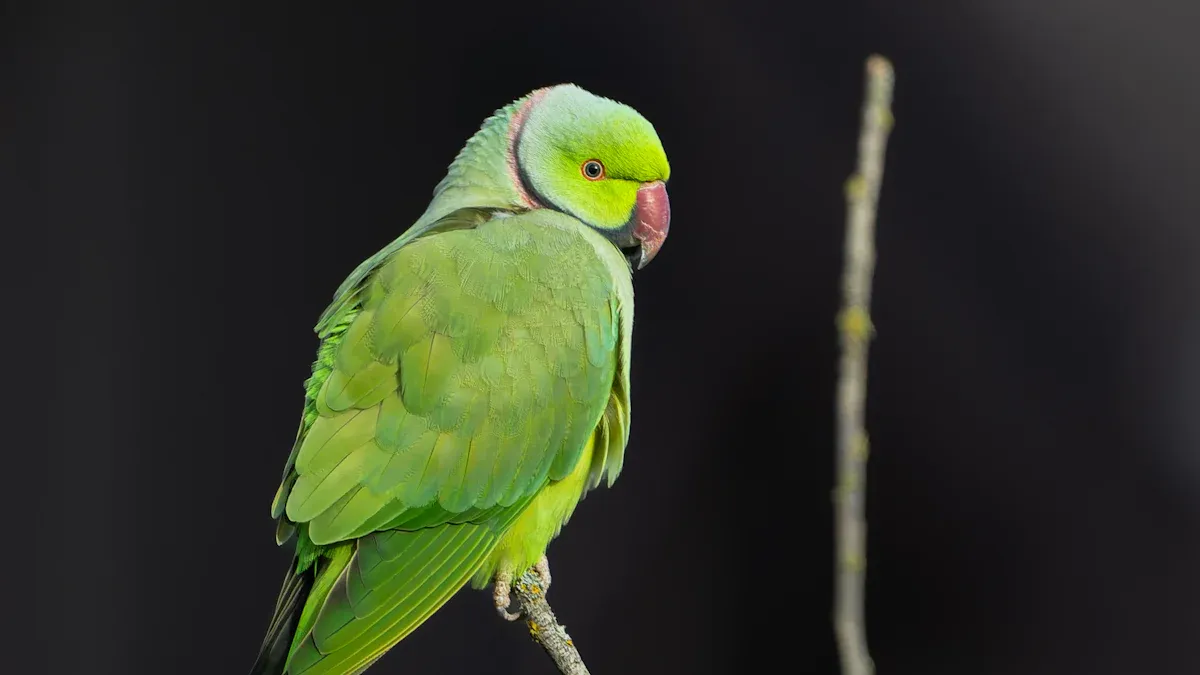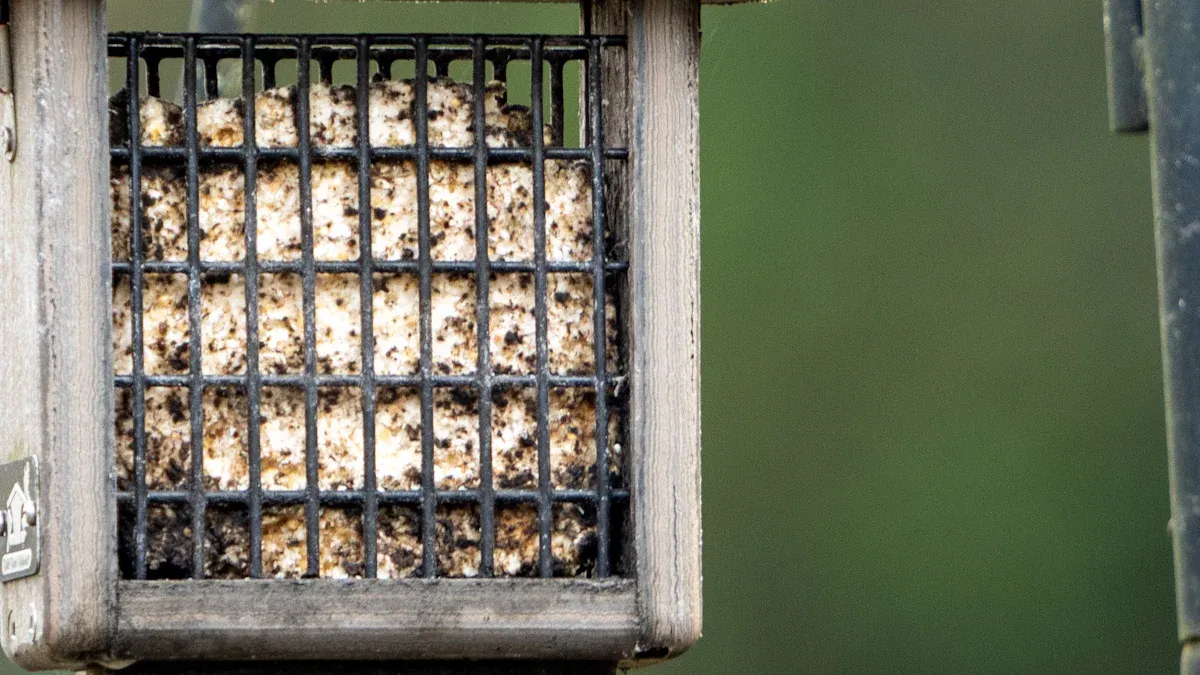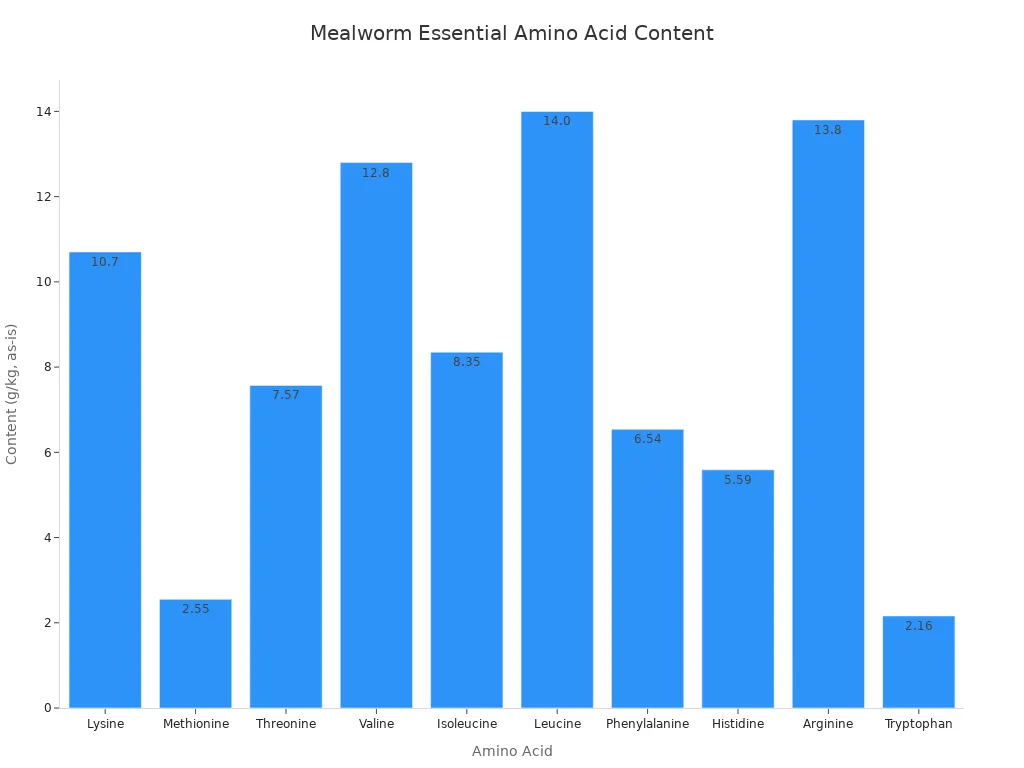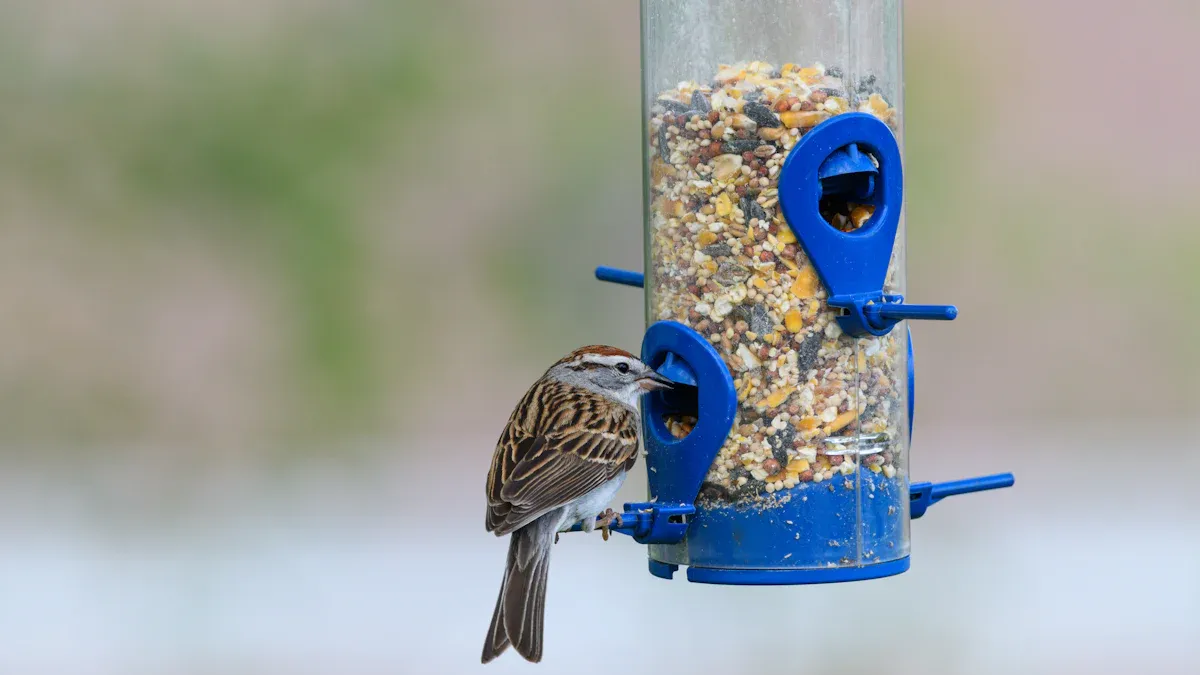
Mealworms for Parrots deliver high-quality protein and healthy fats, supporting active play and shiny feathers. These insects encourage natural foraging behaviors. Many nutrients found in mealworms—such as iron, zinc, and vitamin E—help parrots stay healthy.
| Nutrient | Benefit for Parrots |
|---|---|
| Iron | Supports blood health |
| Zinc | Boosts immune system |
| Vitamin E | Protects cells and feathers |
Key Takeaways
- Mealworms provide high-quality protein and essential nutrients, supporting strong muscles and vibrant feathers in parrots.
- Regularly offering mealworms can enhance parrots’ immune health and energy levels, leading to more playful and active behavior.
- Introduce mealworms gradually and monitor portion sizes to prevent overfeeding and ensure a balanced diet for your parrot.
Mealworms for Parrots: Nutritional Value

Protein and Amino Acids
Mealworms for Parrots supply a rich source of protein. Protein helps parrots build strong muscles and supports growth. Many bird owners choose mealworms because they contain more protein than many other common bird foods. The table below compares the protein content of different insect sources:
| Protein Source | Crude Protein Content (%) |
|---|---|
| Mealworms | 27 – 54 |
| Crickets | 48 – 65 |
| Earthworms | 41 – 66 |
Mealworms also provide essential amino acids. These nutrients help parrots repair tissues and maintain healthy feathers. The chart below shows the amount of each amino acid found in mealworms:

Parrots absorb most of the amino acids from mealworms very efficiently. Studies show that their bodies use over 90% of these nutrients. Adding mealworms to a parrot’s diet helps meet daily protein and amino acid needs. This is especially important during molting or breeding seasons.
Tip: Dried mealworms can be sprinkled on top of regular bird food to boost protein intake. Many colorful birds, such as bluebirds and robins, enjoy this nutritious treat.
Essential Vitamins and Minerals
Mealworms for Parrots contain a wide range of vitamins and minerals. These nutrients keep parrots healthy and active. The table below lists some important vitamins and minerals found in mealworms and their benefits:
| Vitamin/Mineral | Contribution to Parrot Health |
|---|---|
| B1 (Thiamine) | Essential for metabolism and energy production |
| B2 (Riboflavin) | Supports energy production and overall health |
| B3 (Niacin) | Important for metabolism and skin health |
| B5 (Pantothenic Acid) | Vital for fatty acid metabolism |
| B6 (Pyridoxine) | Crucial for protein metabolism and immune function |
| Calcium | Important for bone health |
| Phosphorus | Works with calcium for strong bones |
| Magnesium | Supports muscle function and nerve transmission |
| Potassium | Essential for muscle function and heart health |
Mealworms provide B vitamins, calcium, magnesium, iron, and zinc. These nutrients support metabolism, bone strength, and immune health. Parrots need these vitamins and minerals to stay energetic and fight off illness.
- B vitamins help parrots turn food into energy.
- Calcium and phosphorus keep bones strong.
- Magnesium and potassium support muscles and nerves.
- Iron and zinc boost immune function.
Mealworms are considered nutritional powerhouses. They offer a balanced mix of amino acids, vitamins, and minerals. Parrots benefit from these nutrients every day.
Healthy Fats for Energy
Mealworms for Parrots are rich in healthy fats. These fats give parrots the energy they need to fly, play, and explore. Fats also help keep feathers shiny and skin healthy. Parrots need a certain amount of fat in their diet to stay active and alert.
Mealworms supply protein, fiber, and fat. These nutrients are especially important for young or injured parrots. The high fat content in mealworms supports energy levels and muscle development. Parrots should not eat only mealworms, but they can enjoy them as a daily supplement. Owners can adjust the amount based on the bird’s needs.
Note: Providing a reliable source of protein-rich food, such as dried mealworms, helps many bird species thrive in the garden. Robins and other colorful birds appreciate this nutritious addition.
Mealworms for Parrots: Feather Health and Molting
Promoting Vibrant Plumage
Parrots display their health through the brightness and condition of their feathers. Colorful plumage often signals a well-balanced diet. Mealworms for Parrots supply nutrients that help birds maintain vibrant feathers. Protein in mealworms supports the structure of each feather. Zinc and copper found in mealworms play a role in feather coloration. These minerals help parrots show off their natural colors. Owners notice that birds with access to mealworms often have shinier and smoother feathers. Dried mealworm toppings can attract many species, including robins and bluebirds, who also benefit from improved plumage.
Supporting the Molting Process
Molting is a natural process where parrots shed old feathers and grow new ones. This period can cause stress and discomfort. Nutrients in mealworms help parrots during molting in several ways:
- Protein aids in the growth of strong and vibrant feathers.
- Zinc and copper are crucial for feather coloration and overall health.
- Nutrients help reduce the stress of molting by speeding up feather regeneration.
Parrots need extra nutrition when they molt. Mealworms provide a reliable source of protein and minerals. These nutrients help birds recover faster and maintain their energy. Owners who add dried mealworms to their birds’ diets often see quicker feather regrowth and less stress during molting.
Mealworms for Parrots: Enrichment and Mental Stimulation

Encouraging Natural Foraging
Parrots enjoy searching for food. This activity keeps them busy and helps prevent boredom. Mealworms for Parrots encourage birds to use their natural foraging skills. Owners often hide dried mealworms in toys or under leaves. Parrots must look, pick, and manipulate objects to find their treat. This process gives birds a sense of achievement.
Studies show that foraging enrichments help parrots in several ways. Birds spend more time searching for food and less time on destructive behaviors. Starlings also prefer searching for mealworms instead of eating food that is easy to reach. The table below highlights findings from behavioral studies:
| Evidence Description | Findings |
|---|---|
| Foraging enrichments in parrots | Required manipulation of food, leading to reduced feather destructive behaviors and improved overall behavior. |
| Preference of starlings for mealworms | Starlings preferred searching for mealworms over easy access, indicating a natural foraging behavior. |
| Foraging toys and trees | Encouraged foraging behavior in parrots, helping to manage feather destructive behavior and other stereotypies. |
| Starlings foraging on mealworms | Increased search time for mealworms when they were harder to find, demonstrating natural foraging behavior. |
Tip: Hide dried mealworms in different spots to create a fun challenge for your parrot.
Enhancing Cognitive Abilities
Parrots need mental stimulation to stay healthy. Searching for mealworms helps birds think and solve problems. They learn to open toys, move objects, and remember hiding places. This activity strengthens their memory and sharpens their senses.
Owners notice that parrots who forage for mealworms show more curiosity and alertness. Birds become more active and playful. Simple games, such as hiding mealworms in puzzle feeders, keep parrots engaged. These activities support brain health and reduce stress.
- Parrots use their beaks and feet to explore.
- They develop new skills while searching for food.
- Regular enrichment leads to happier and healthier birds.
Mealworms for Parrots: Overall Well-Being
Boosting Immune Health
Mealworms for Parrots provide important nutrients that help birds stay healthy. Vitamin E and zinc play a key role in supporting the immune system. Birds that eat mealworms often show stronger resistance to common illnesses. Owners notice that their parrots recover faster from minor health issues when they receive a balanced diet with mealworms. Dried mealworm toppings offer a reliable source of protein, which helps the body build antibodies. Parrots need these nutrients to fight off infections and stay active.
| Nutrient | Immune Benefit |
|---|---|
| Vitamin E | Protects cells |
| Zinc | Boosts immune response |
| Protein | Builds antibodies |
Tip: Regular feeding of dried mealworms can help parrots maintain a strong immune system, especially during stressful times like molting.
Increasing Energy and Activity
Parrots need energy to fly, play, and explore their environment. Mealworms for Parrots supply healthy fats and protein, which give birds the fuel they need for daily activities. Owners often see more playful behavior and increased curiosity after adding mealworms to the diet. Young parrots benefit from extra energy as they grow and learn new skills. Dried mealworms also help older birds stay active and alert. A varied diet with mealworms supports muscle strength and stamina.
- Parrots show more interest in toys and games.
- Birds spend more time exploring and foraging.
- Increased energy leads to better overall health.
Mealworms for Parrots help birds stay lively and engaged every day.
Safe Feeding Practices for Mealworms for Parrots
Portion Size and Frequency
Parrots enjoy mealworms as a tasty treat, but owners must pay attention to how much and how often they offer them. Avian nutritionists recommend giving mealworms only occasionally. Parrots should not eat mealworms every day. Instead, owners can provide them every other day or a couple of times per week. This schedule helps maintain a balanced diet and prevents overfeeding.
- Mealworms serve best as a supplement, not a staple food.
- Most parrots thrive when mealworms are offered two or three times weekly.
- Small portions, such as a few dried mealworms per feeding, work well for most birds.
A regular feeding routine supports healthy digestion and keeps parrots interested in their food. Owners who follow these guidelines help their birds stay energetic and healthy.
Tip: Use mealworms as a reward during training or enrichment activities to make feeding time more exciting.
Choosing and Preparing Mealworms
Selecting high-quality mealworms is important for parrot health. Owners should look for mealworms that are clean, dry, and free from mold. Moisture can cause mold growth, which is dangerous for birds. Freeze-dried mealworms offer a convenient and safe option. These mealworms have a long shelf life and are easy to store.
- Keep mealworms dry to prevent spoilage.
- Use feeders with proper drainage to avoid moisture buildup.
- Secure live mealworms in feeders to prevent escape.
Regular cleaning of feeders helps maintain hygiene. Owners should wash feeders weekly to remove any leftover food and bacteria. Clean feeding areas reduce the risk of illness and keep birds safe.
| Preparation Step | Benefit |
|---|---|
| Keep mealworms dry | Prevents mold and spoilage |
| Use proper feeders | Maintains cleanliness |
| Clean regularly | Supports bird health |
Bird Dried Mealworm Topping attracts many colorful birds, including robins and bluebirds. This product provides all the protein without the wriggle, making it easy for owners to offer a reliable source of nutrition.
Monitoring for Allergies and Sensitivities
Introducing new foods requires careful observation. Parrots may react differently to mealworms, so owners should start slowly. Begin with a small amount once or twice a week. Watch for signs of allergies or digestive problems, such as changes in behavior or droppings. If the parrot tolerates mealworms well, owners can gradually increase the portion size.
- Start gradually with small servings.
- Choose mealworms from reputable sources to ensure quality.
- Use moderation and keep mealworms as an occasional treat.
The VITAL Scientific Expert Panel highlights the importance of clean and safe feeding practices. Birds rarely experience allergies, but clean feeders and fresh mealworms lower the risk even more. Owners should keep track of their parrot’s diet and consult a veterinarian if they notice any unusual symptoms.
Note: Careful monitoring and gradual introduction help parrots enjoy new foods safely.
Potential Risks and Considerations with Mealworms for Parrots
High Fat Content and Overfeeding
Mealworms contain a high level of protein and fat. Parrots who eat too many mealworms may develop health problems. Obesity and liver issues can occur if owners do not control portions. The table below compares the protein and fat content of mealworms and millet:
| Food Item | Protein | Fat | Carbohydrates |
|---|---|---|---|
| Mealworms | 53% | N/A | N/A |
| Millet | 11% | 4% | 73% |
To prevent overfeeding, owners should follow these steps:
- Limit mealworms to 2-3 pieces per serving, once or twice a week.
- Monitor the parrot’s weight and energy levels.
- Track other protein sources in the diet.
Tip: Purchase mealworms from reputable pet stores and check for labels like “safe for birds” or “free of additives.” Avoid feeding mealworms collected from gardens.
Digestibility and Exoskeleton Concerns
Parrots digest mealworms easily, but the exoskeleton can sometimes cause minor issues. Young or small parrots may struggle to break down the tough outer shell. Owners should choose dried mealworms, which are easier to chew and digest. Feeding small portions helps prevent digestive upset. Clean and dry mealworms reduce the risk of contamination.
Observing Parrot Reactions
Owners should watch for changes in their parrot’s behavior after introducing mealworms. Signs to monitor include:
- Increased energy
- Brighter feathers
- More interest in food
- Signs of upset or refusal to eat
If a parrot shows negative reactions, owners should reduce the amount or stop feeding mealworms. Regular observation helps ensure a safe and enjoyable diet for every bird.
Mealworms for Parrots offer nutritional and behavioral benefits when owners use them with care. Key factors include nutritional content, quality, and safety. Owners should:
- Watch for changes in behavior or droppings.
- Seek veterinary advice if symptoms appear.
Proper monitoring ensures a positive experience for every bird.
FAQ
Can parrots eat dried mealworms safely?
Parrots can eat dried mealworms safely. Owners should choose clean, dry mealworms and offer them in small amounts. Dried mealworms provide protein without the risk of spoilage.
How often should parrots get mealworms?
- Parrots benefit from mealworms two or three times weekly.
- Small portions help maintain a balanced diet and prevent overfeeding.
What are the main benefits of mealworms for parrots?
| Benefit | Description |
|---|---|
| Protein | Builds strong muscles |
| Feather Health | Supports vibrant plumage |
| Mental Stimulation | Encourages foraging skills |


